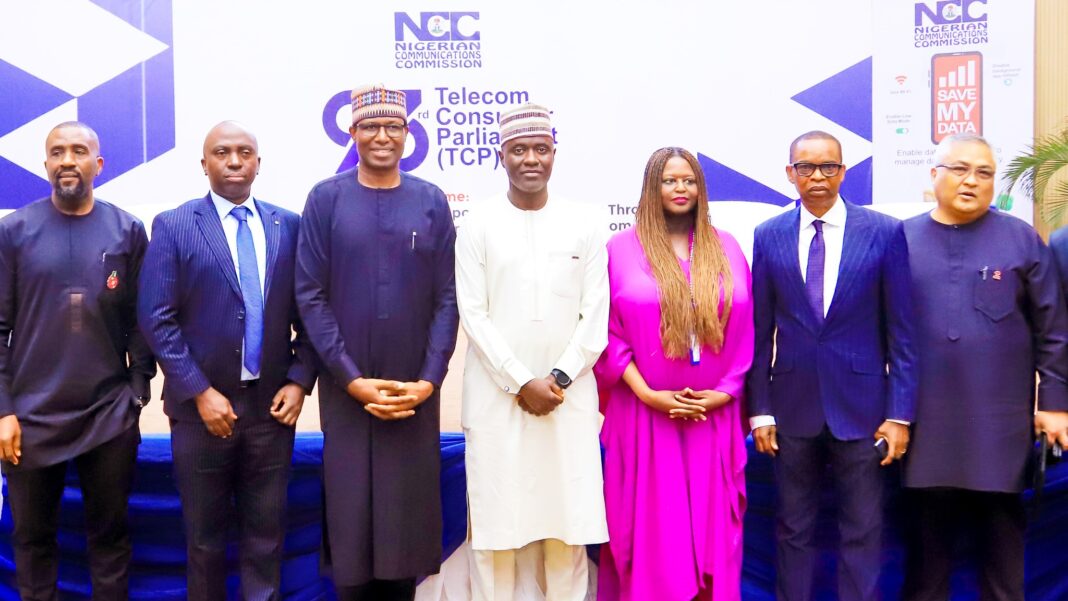The Executive Vice Chairman of the Nigerian Communications Commission (NCC), Dr Aminu Maida, has reaffirmed the Commission’s commitment to transparency and accountability within the sector.
He gave the assurance while delivering Keynote Speech at the 93rd Telecoms Consumer Parliament (TCP) held at the Communications and Digital Economy Complex Auditorium on November 7, 2024.
The theme of the event was “Optimizing Data Experience: Empowering Consumers through Awareness and Transparency in a Consumer-Centric Telecom Industry.”
The EVC said, “I want to reaffirm the Commission’s commitment to transparency and accountability within the sector. The Commission is finalizing our Major Incident Reporting Guidelines, which will require operators to inform consumers of major incidents impacting their networks, with these reports also accessible on our website. Consumers can also soon expect coverage maps detailing operators’ network strength across the country. These maps will indicate coverage gaps, service quality, and signal strength, allowing consumers to make more informed choices when selecting an operator.”
According to Maida, over the past two decades, the telecommunications landscape in Nigeria has transformed from basic voice services to high-speed data that connects, informs, and powers innovations. “With the rollout of 3G, 4G, and now 5G, we’ve seen Nigerians adopting social media, e-commerce, online banking, and more. The introduction of 3G networks in the mid-2000s marked the beginning of this shift, enabling basic browsing and email. The leap to 4G LTE brought faster speeds, enabling video streaming, online gaming, and a myriad of digital activities. Now, with 5G promising even faster speeds and lower latency, new frontiers are opening for innovations such as smart cities, autonomous vehicles, and the Internet of Things, driving further demand for data.
“Today, as data consumption grows, fueled by digital advancements, we must address consumer concerns over data depletion and billing transparency,” Maida said.
He disclosed that globally, DataReportal has shown that there are now over 5 billion internet users, with Nigeria alone accounting for 132 million connections. “Nigerians spend an average of 4 hours and 20 minutes on social media daily, far above the global average, underscoring how deeply embedded digital interaction is in our lives. In 2024, Nigeria’s daily data usage averaged 336 gigabytes per second, marking a 39% increase from the previous year—a clear indication of the data-driven lifestyle many Nigerians lead.
“Despite this, many consumers feel their data depletes faster than expected, echoing a sentiment I hear often. Nigeria isn’t alone in this; other countries, like Eswatini, are also working to address similar consumer concerns about data usage,” he stated.
Maida said the NCC analyzed consumer complaints reveals that data depletion and billing issues as top concerns. “In response, we directed Mobile Network Operators and ISPs to conduct audits of their billing systems, which reported no major issues. However, perceptions persist due to two main factors: the impact of high-resolution devices and improved technologies on data use and the complexity of operator tariffs.
He stated that with the advent of 4G and 5G, as well as devices with ultra-high-definition screens, data consumption has naturally increased. “For example, while viewing a photo on Instagram might have required only 100 kilobytes of data five years ago, today, with advanced camera resolutions, a photo can consume between two to four megabytes when opened on Instagram. According to Tech Advisor, an online resource that offers tech reviews, spending an hour on Instagram can set you off an average of 600 Megabytes of your data, while streaming platforms like YouTube would set you off by about 3.5 to 5.4 Gigabytes per hour.
“Improved technologies go beyond their purchase cost to our pockets; they also come at a cost to data. Because they have better screen resolutions, they consume higher quality media that consumes more data. This is the same for our increasing digital habits: according to DataReportal, the world’s internet users are spending less time watching television; the average daily television viewing has fallen by over 8% in the past one year. These viewers are now spending more time on their telephones, tablets, and smart TVs streaming programmes that they would previously have watched on broadcast television,” Maida explained.
He said recognizing these challenges, the Commission, in collaboration with major operators, launched a Joint Industry Campaign on Consumer Awareness on Smarter Data Usage. This media campaign, spanning radio, television, newspapers, and SMS, aims to educate consumers on effective data management. I am sure many of you have encountered jingles or graphics offering tips for managing data. Our message emphasizes empowering consumers with the knowledge to optimize their data usage. For example, many smartphone users may not know that their devices can track data usage and allow them to set limits on the amount of data they want to use.
Photo: L-R: Head, Customer Operations, North, MTN, Chikaodi Ofoegbe; Chief Executive Officer, 9Mobile, Obafemi Banigbe; Chairman, Association of Licensed Telecom Operators of Nigeria, Gbenga Adebayo; Executive Vice Chairman/Chief Executive Officer, Nigerian Communications Commission (NCC), Dr. Aminu Maida; Executive Commissioner, Stakeholder Management, NCC, Rimini Makama; Director, Consumer Affairs Bureau, Dr. Ikechukwu Adinde and Chief Executive Officer, Airtel Nigeria, Carl Cruz during the 93rdedition of the Telecom Consumer Parliament hosted by the Commission in Abuja on Thursday, November 7, 2024.












